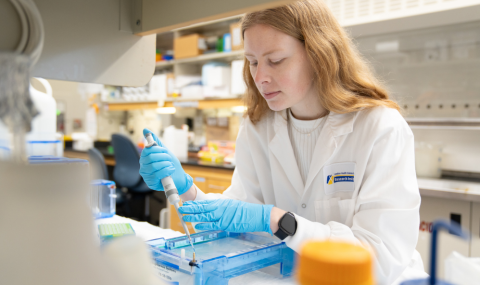Division of Specialty Biochemistry
The Specialty Biochemistry laboratories have state of the art facilities and technology. To keep up with the pace of advanced techniques in laboratory medicine, we continue to add new tests and/or replace equipment as the need arises. We have many years of experience performing specialty tests such as immunosuppressant drug levels, autoantibody testing for autoimmune diseases, tumour marker and hormone testing, and trace elements testing, just to name a few.
The Specialty Biochemistry laboratories are composed of four main areas, each with its own specialty:
- Clinical Immunology
- Endocrinology
- Toxicology and Therapeutic Drug Monitoring
- Trace Elements
The Clinical Immunology laboratory specializes in performing protein electrophoresis and autoimmune antibody testing such as a comprehensive autoimmune encephalitis panel, a paraneoplastic antibody panel, a neuromyelitis spectrum profile, an autoimmune liver disease profile, and a myositis profile. We use various techniques such as enzyme-linked immunosorbent assay (ELISA) and immunofluorescence assay (IFA), including tissue immunohistochemistry and cell-based assays, immunoblot, and fluorescent enzyme immunoassay (FEIA).
The Endocrinology laboratory provides testing mostly for hormones and tumour markers. We have various platforms such as automated chemiluminescent and fluorescent immunoassay analyzers.
The Toxicology and Therapeutic Drug Monitoring laboratory offers a wide test menu of immunosuppressant/therapeutic drugs, drugs of abuse testing and confirmations, vitamin testing, renal stone analysis, and more. Our predominant methodologies are triple quadrupole liquid chromatography/mass spectrometry (LC/MS/MS), gas chromatography/mass spectrometry (GC/MS), and gas chromatography (GC).
The Trace Elements laboratory offers the widest range of trace element analysis for nutritional and toxic elements of clinical interest in Canada. Testing is used to assess deficiencies, measure nutrient intake, monitor toxic exposure through environmental or occupational exposure, and provide metal analysis for patients with orthopedic implants. We use high resolution sector field inductively coupled plasma mass spectrometry (HR-SF-ICP-MS) technology.
Contacts
Division HeadDr. Michael Knauer | ManagerMeghan Fretter | Section HeadDr. Liju Yang |
Section HeadDr. Angela Rutledge | Section HeadDr. Matthew Nichols | Section HeadDr. Adrian Budhram |
Senior TechnologistKaren Gresty | Senior TechnologistCindy Iacobelli | Senior TechnologistLingBing Zhong |
Senior TechnologistErin Freeman | ||


